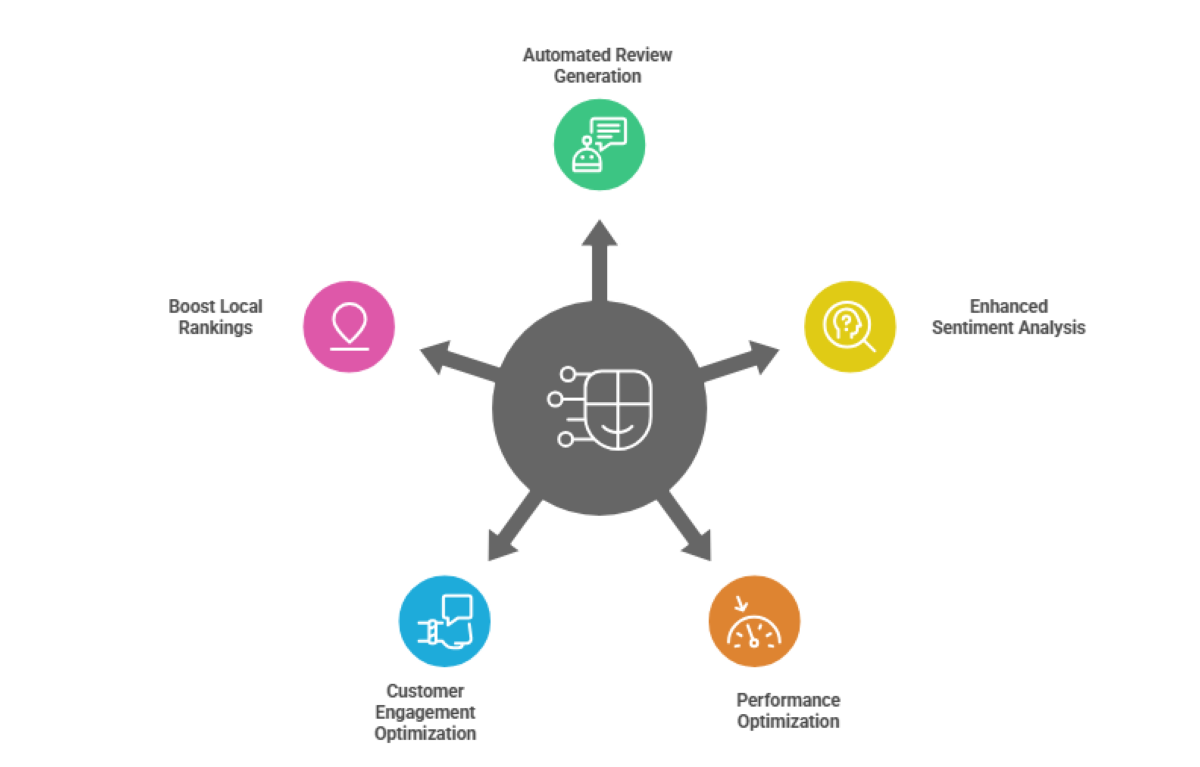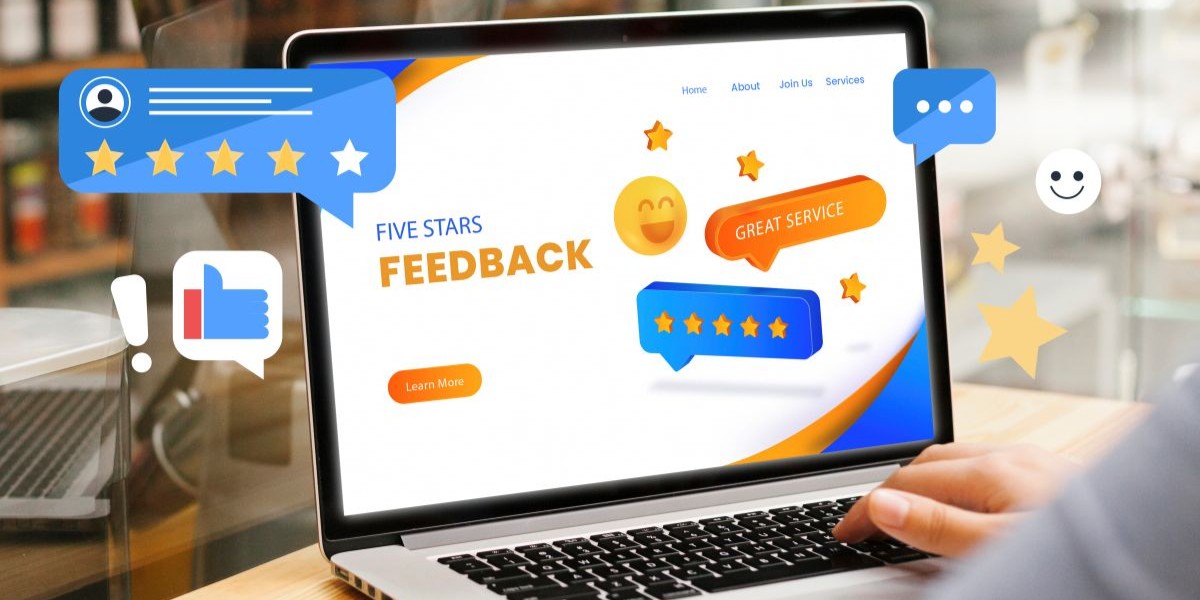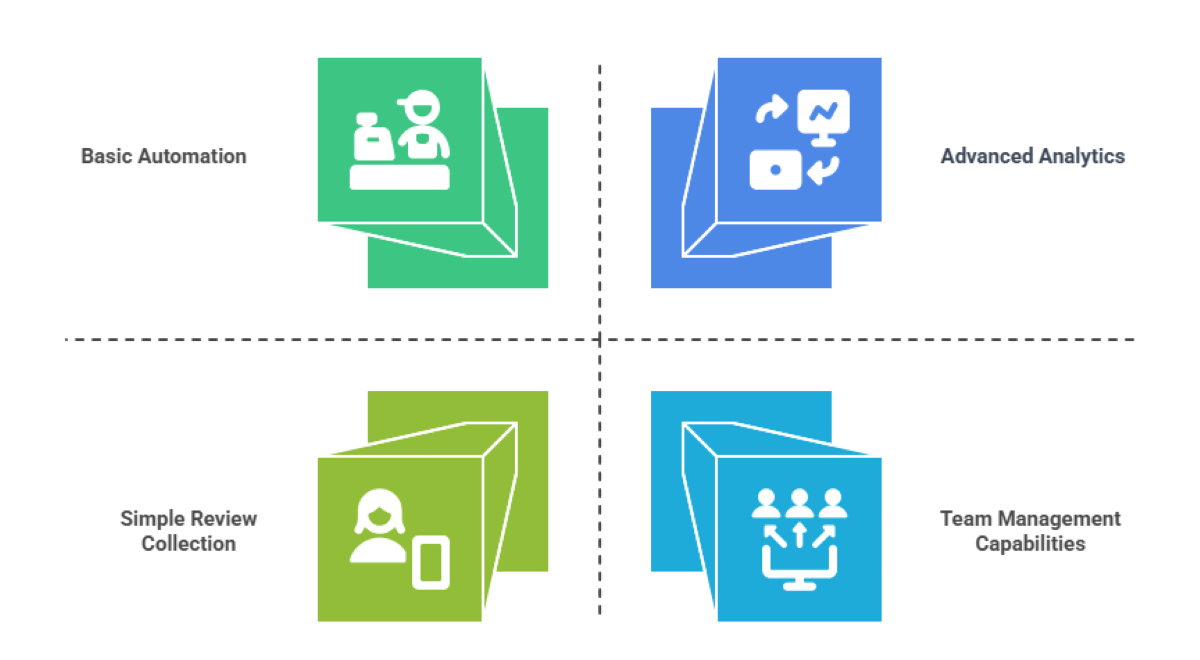
Managing customer reviews across multiple platforms has become increasingly complex for businesses of all sizes. Between monitoring various review sites, analyzing customer sentiment, and crafting appropriate responses, the manual approach to review management often proves overwhelming and time-consuming.
Artificial intelligence has emerged as a solution to these challenges, transforming how businesses handle online feedback. Research from PowerReviews indicates that 99.9% of consumers read online reviews before making a purchase, highlighting the critical importance of effective review management. AI-powered platforms now automate many traditionally manual processes, from sentiment analysis to response generation, enabling businesses to maintain better oversight of their online reputation.
Understanding AI-driven customer review management tools
AI-driven customer review management tools are software platforms that utilize artificial intelligence to automate the collection, monitoring, and response processes for online reviews. These systems differ from traditional review tracking methods by incorporating machine learning algorithms that can identify patterns in customer feedback, predict optimal timing for review requests, and generate contextually appropriate responses.
The core distinction lies in their ability to process large volumes of data simultaneously. Rather than requiring manual review of each platform and individual response crafting, AI tools can monitor numerous review sites concurrently, analyze customer sentiment in real-time, and suggest or generate responses that align with brand voice guidelines. These systems can also identify which customers are most likely to provide reviews based on their interaction history and engagement patterns.
Key benefits of AI implementation in review management

Organizations implementing AI-powered review management systems typically experience several operational improvements across different areas of their business operations.
Automated review generation and collection
AI systems analyze customer behavior patterns, purchase history, and service completion data to determine optimal timing for review requests. These tools can automatically send personalized review invitations through various channels, including SMS, email, and messaging platforms, reducing the manual effort required to maintain consistent review collection.
Enhanced sentiment analysis capabilities
Modern AI tools employ natural language processing to analyze review content beyond simple positive or negative classifications. These systems can detect nuanced emotions such as frustration, satisfaction, confusion, or excitement within customer feedback, enabling businesses to understand the specific context behind customer opinions and tailor their responses accordingly.
Performance Optimization
Manual review management typically requires 3-5 hours weekly for small businesses and significantly more time for larger operations. AI-powered workflows automate routine tasks, including review monitoring, response drafting, and follow-up scheduling, allowing staff to focus on strategic activities rather than administrative tasks.
Customer engagement optimization
AI tools facilitate faster response times to customer feedback by generating initial response drafts and alerting teams to new reviews in real-time. Research suggests that businesses responding to reviews within 24 hours demonstrate improved customer retention rates compared to those with delayed response times.
Boost Local Rankings
Search engines consider review frequency, recency, and business responsiveness as factors in local search rankings. AI tools help maintain consistent review activity by ensuring systematic responses to customer feedback and generating fresh content through ongoing customer interactions.
Leading AI-driven review management platforms

The market includes several established platforms, each offering different approaches to AI-powered review management based on varying business requirements and operational scales.
Birdeye
Birdeye operates as a comprehensive reputation management platform serving over 150,000 businesses globally. The system integrates with more than 150 review platforms and offers centralized dashboard management for multi-location businesses.
Primary capabilities include:
- Automated review request systems triggered by customer interactions
- Multi-platform monitoring covering major review sites and social media channels
- AI-powered sentiment analysis with competitive benchmarking features
- Integration compatibility with over 3,000 business applications, including CRM systems
- Centralized response management across all connected platforms
Spreadical
Spreadical focuses specifically on Google review management through WhatsApp integration, offering a unique approach to review handling via messaging platforms.
Core functionalities include:
- Real-time Google review monitoring with WhatsApp notifications
- AI-generated response suggestions based on review content and sentiment
- Automated review collection campaigns through WhatsApp messaging
- Cloud-based storage and analytics for review tracking and performance measurement
- Direct response management through the WhatsApp interface without separate dashboards
Podium
Podium provides a unified communication platform that incorporates review management alongside broader customer messaging capabilities.
Key features encompass:
- Centralized customer communication hub integrating multiple channels
- Automated review request functionality through text and email
- Payment processing integration within messaging workflows
- Google Business Profile integration for streamlined review collection
- Multi-channel customer interaction management
NiceJob
NiceJob targets small to medium-sized businesses with an emphasis on automation and social media integration for review marketing.
Notable features include:
- Automated email and SMS review collection campaigns
- Social media content generation using collected customer reviews
- Referral program management with automated tracking
- Simple implementation process designed for non-technical users
- Cost-effective pricing structure with flexible contract terms
Trustpilot AI
Trustpilot operates as a major review platform that has integrated AI tools for both platform integrity and business review management. According to their 2025 Trust Report, Trustpilot removed 4.5 million fake reviews in 2024, with 90% identified automatically through AI systems.
Platform features include:
- Advanced sentiment analysis with topic-specific scoring
- AI-powered review summarization and trend identification
- Automated response suggestions for review management
- Large-scale review processing with over 300 million total reviews
- Comprehensive fraud detection using machine learning algorithms
Impact of AI tools on Google reviews and local SEO
AI-powered review management systems influence local search visibility through several mechanisms that affect how businesses appear in location-based search results.
Local ranking factor optimization
Google’s local search algorithm incorporates review frequency, recency, and business responsiveness as ranking signals. AI tools help maintain consistent review generation and ensure prompt responses, which typically improve local search visibility within 60-90 days of implementation.
Response optimization for search relevance
AI systems can incorporate relevant keywords and location-specific information naturally within response content. This additional text provides search engines with more context about the business and its services, potentially improving local SEO performance over time.
Review quality enhancement
AI platforms can guide customers toward providing detailed, informative reviews through strategic timing and messaging. Higher-quality reviews offer more context for potential customers and create additional searchable content that may improve overall online visibility.
Competitive advantage through consistency
Businesses using AI review management typically maintain more consistent online engagement patterns compared to those relying solely on manual processes. This consistency can build trust with both customers and search engines, potentially creating sustained competitive advantages in local market positioning.
A case study of Clark’s Pizza’s transformation
Clark’s Pizza demonstrates the transformative power of Spreadical’s AI review management, showing how strategic implementation can rapidly reverse declining customer trust and restore market leadership.
- Declining Performance: The business was losing customer trust at a rate of 5% monthly and dropping 2-3 positions in local search rankings due to inconsistent review management practices.
- Spreadical’s AI Solution: Spreadical’s advanced sentiment analysis identified negative patterns and automated personalized responses that addressed customer concerns while the AI system optimized review request timing for maximum positive feedback collection.
- Market Recovery: The business reclaimed the top spot for pizza searches in their area, demonstrating how Spreadical’s AI review management can quickly restore competitive positioning and customer confidence.
Cost analysis and return on investment considerations
Understanding the financial implications of AI review management helps businesses evaluate the potential value relative to their current manual processes.
Pricing structure overview
Small businesses typically invest $299-$450 monthly for AI review management solutions, while mid-size companies generally pay $349-$649 monthly. Enterprise-level platforms range from $500-$2,000+, with pricing usually determined by location count, review volume, and feature requirements. Most platforms offer tiered pricing structures based on automation complexity and integration needs.
Operational cost savings
Manual review management requires approximately $15-25 per hour in staff time for monitoring, response writing, and platform management. AI tools can reduce this time investment significantly, often offsetting subscription costs through labor savings alone. Additional savings may result from improved customer retention and reduced need for paid advertising to counteract reputation issues.
Revenue impact measurement
Many AI review platforms provide analytics that connect review improvements to business metrics such as phone calls, website visits, and sales inquiries. Businesses typically observe revenue increases within six months of implementing comprehensive AI review management systems, though results vary based on industry and implementation quality.
Long-term value creation
Beyond immediate operational benefits, AI review management builds valuable business assets, including improved online reputation, stronger customer relationships, and enhanced search engine visibility. These assets tend to compound over time, creating increasing returns on the initial platform investment as the business grows and review volume increases.
Selection criteria for AI review management platforms

Choosing an appropriate platform requires careful evaluation of several factors that align with specific business requirements and operational constraints.
Business scale and complexity assessment
Single-location businesses have different requirements compared to multi-location enterprises. Smaller operations may benefit from simple, automated systems focused on basic review collection and response, while larger organizations typically require advanced analytics, team management capabilities, and extensive integration options. Consider both current needs and anticipated growth when evaluating platforms.
Integration requirements evaluation
Review management systems work most effectively when connected to existing business software. Evaluate how well potential platforms integrate with current CRM systems, point-of-sale software, email marketing tools, and other business applications. Seamless integration prevents data silos and improves overall operational efficiency.
Feature prioritization framework
Different AI capabilities provide varying value based on specific business challenges. Prioritize features that address current pain points: sentiment analysis for reputation-focused businesses, automation for time-constrained operations, or advanced analytics for data-driven organizations. Avoid paying for unnecessary features that don’t align with business objectives.
Implementation and support considerations
AI tools require initial setup, staff training, and ongoing optimization to achieve maximum effectiveness. Evaluate the level of implementation support, training resources, and customer service provided by each platform. Consider the technical expertise of your team when assessing support requirements and platform complexity.
Future developments in AI-driven review management
The evolution of AI technology continues to expand the capabilities and applications of review management systems across different business contexts.
Predictive analytics advancement
Next-generation AI systems will likely develop sophisticated predictive capabilities, analyzing customer behavior patterns, service delivery metrics, and external factors to identify potential reputation issues before they occur. This proactive approach could enable businesses to address problems before they impact customer satisfaction and review scores.
Voice and multimedia review processing
As voice search and audio reviews become more prevalent, AI platforms are developing capabilities to process spoken feedback and detect emotional tone in audio content. These systems may eventually generate appropriate audio responses automatically, expanding beyond text-based review management.
Enhanced personalization through machine learning
Future AI platforms will likely create highly personalized review experiences for individual customers, optimizing everything from request timing to response style based on specific customer preferences and historical behavior patterns. This level of customization could improve both review collection rates and customer satisfaction.
Cross-platform reputation orchestration
Advanced AI systems will manage reputation across an expanding range of platforms, including social media networks, review sites, industry-specific directories, and emerging digital channels. This comprehensive orchestration will ensure consistent brand representation across all customer touchpoints online.
Final words
AI-driven customer review management tools represent a significant evolution in how businesses maintain their online reputation and engage with customer feedback. These platforms address the scalability challenges inherent in manual review management while providing sophisticated analytics and automation capabilities that were previously unavailable.
The documented success of implementations like Spreadical’s work with local businesses demonstrates the tangible impact these tools can have on both online reputation and business performance. With advanced sentiment analysis, predictive capabilities, and integrated communication features, modern AI platforms offer comprehensive solutions for businesses seeking to optimize their review management processes.
Frequently asked questions
What are AI-driven customer review management tools?
AI-driven customer review management tools are software platforms that use artificial intelligence to automate the collection, monitoring, analysis, and response processes for online customer reviews. They learn from business patterns and customer interactions to optimize review management without manual intervention.
How does AI improve customer review collection and response?
AI improves review collection by identifying optimal timing for review requests based on customer behavior patterns and service completion data. For responses, AI analyzes sentiment and context to generate personalized, brand-appropriate replies that address specific customer concerns more effectively than generic templates.
Which AI review tool is best for small businesses in 2025?
Several platforms are well-suited for small businesses due to their affordable pricing, simple setup, and focus on essential automation features. These platforms require minimal technical expertise while delivering significant improvements in review generation and management efficiency, with Spreadical standing out for its enterprise-level capabilities at accessible pricing.
Can AI review software increase Google ratings?
Yes, AI review software typically increases Google ratings by optimizing review request timing, improving response rates from satisfied customers, and helping businesses address negative feedback more effectively. Most businesses see rating improvements within 30-90 days of implementation.
How much do AI review management tools cost?
Pricing varies by business size and feature requirements. Small businesses typically pay $30-150 monthly, mid-size companies invest $150-500 monthly, and enterprise solutions range from $500-2000+ monthly. Most platforms offer tiered pricing based on location count and automation complexity.
Do AI-driven tools support multi-location review management?
Most enterprise-level AI review management platforms support multi-location businesses with centralized dashboards, location-specific analytics, and automated workflows. Platforms like Spreadical specialize in managing reviews across hundreds or thousands of locations simultaneously.
How does sentiment analysis in AI review tools work?
Sentiment analysis uses natural language processing to analyze review text and identify emotional tone, specific concerns, and satisfaction levels. Advanced systems detect nuanced emotions beyond simple positive/negative classifications, enabling more appropriate and effective response strategies.
Can AI tools auto-respond to reviews?
Yes, most AI review management tools can automatically generate and post responses to reviews. However, many businesses prefer to review AI-generated responses before posting to ensure brand alignment and appropriateness, especially for negative reviews or complex situations.
What features should I look for in AI review software?
Key features include multi-platform monitoring, automated review requests, sentiment analysis, response generation, integration capabilities with existing business systems, analytics and reporting, and scalability to support business growth. The specific feature priority depends on your business size and industry.
Are AI-powered review tools suitable for eCommerce stores?
AI-powered review tools work excellently for eCommerce stores, especially platforms that integrate with popular shopping platforms like Shopify, Amazon, or WooCommerce. They can automatically trigger review requests after purchase delivery and help manage reviews across multiple selling channels simultaneously.


